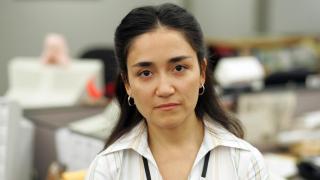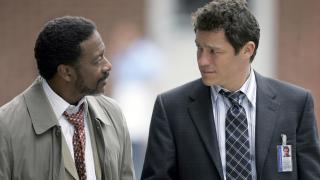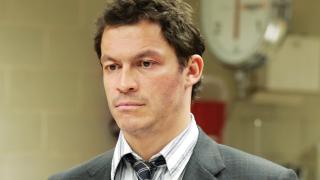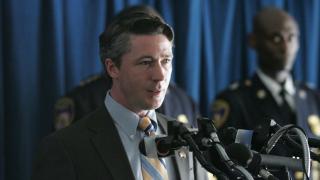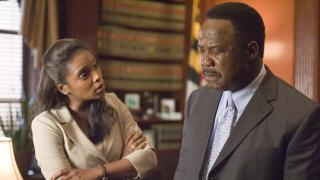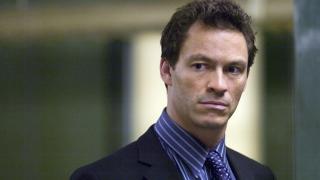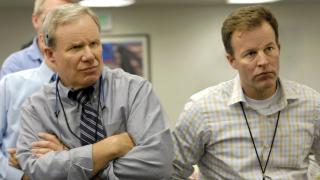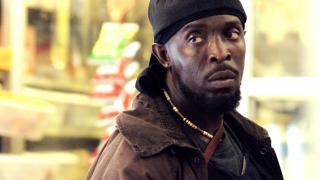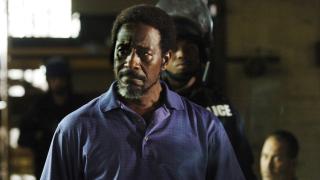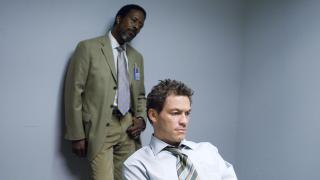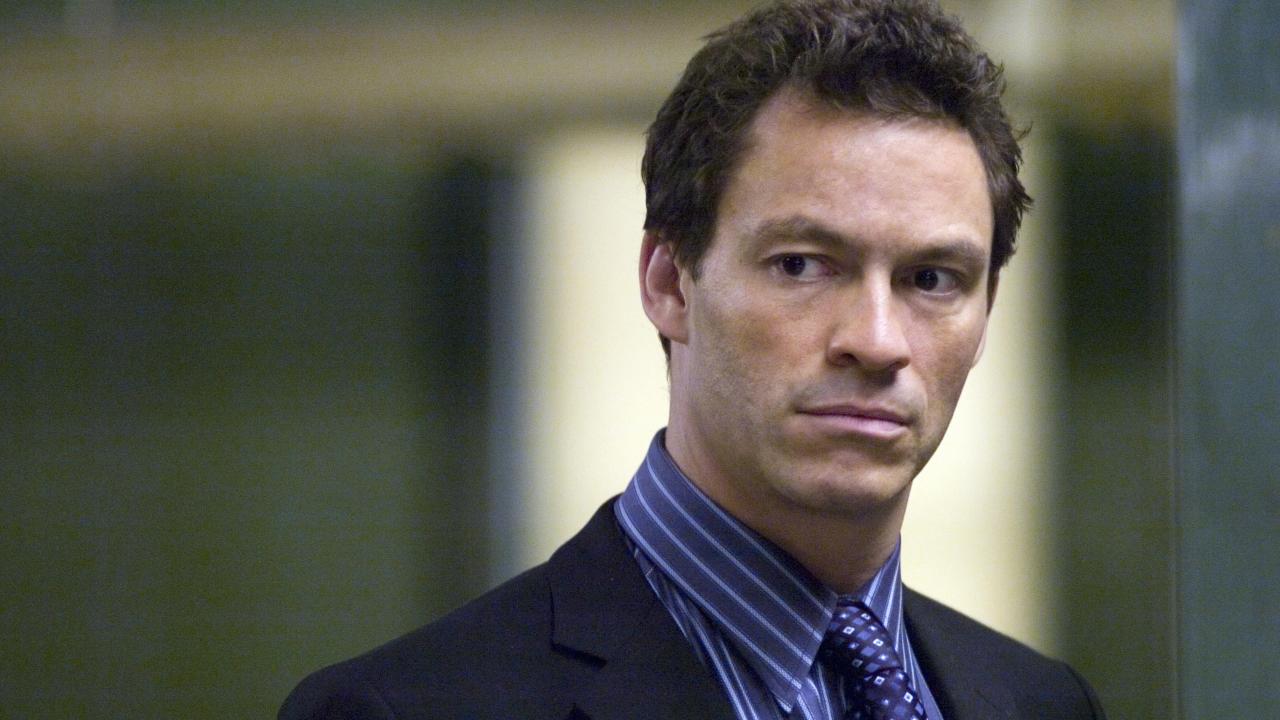
The Dickensian Aspect
TV-MA | 59 MIN
Directed by Seith Mann
Story by David Simon & Ed Burns
Teleplay by Ed Burns
"If you have a problem with this, I understand completely." - Freamon
Chris Partlow and his crew search the area around Monk's condo for any sign of Omar Little, while Snoop checks local hospitals and Monk — posing as a detective — interviews the neighbors. Marlo Stanfield pulls up to the condo to meet Chris, who has nothing to show his boss, and surveys the high balcony where Omar leapt before disappearing. It doesn't seem possible, Marlo says.
At a Baltimore port, Mayor Thomas "Tommy" Carcetti cuts the ribbon for his New Westport Project with developer Andrew Krawczyk, following the Democratic National Committee's advice to "put his name on something." As Carcetti's brief speech concludes, a group of longshoremen heckle Krawczyk, vilifying him for gutting the ports.
Back at the same high rise that Chris and his crew just finished searching, Omar fashions a makeshift crutch from a broomstick in a utility room. Hobbling out on his injured ankle, he finds the coast clear and slips away.
Det. James "Jimmy" McNulty sits with his feet propped on his desk at the homicide unit, reading the latest reports on his serial killer and explaining to Det. William "Bunk" Moreland how the reporter has started to make up his own story. McNulty's waiting for an afternoon press conference to inject his false investigation with funds. Bunk, however, has reopened the files on real murders and tells McNulty he's starting at square one with all the vacant cases — because he plans to actually do his job. McNulty shrugs off the insult and promises Bunk any cars, overtime or lab work he needs after the city releases funding for the serial killer search.
At the Baltimore Sun offices, reporters Scott Templeton and Alma Gutierrez read Templeton's story about the call he received from the serial killer. As Alma imagines that he handed the killer his business card, Executive Editor James C. Whiting III and Managing Editor Thomas Klebanow walk over to compliment Templeton on the story. When Klebanow asks the reporter what he has planned for the next day, Templeton pitches the first idea that comes to mind: A night spent with the homeless. Whiting likes it and leaves to speak to City Editor Augustus "Gus" Haynes. Klebanow also informs Templeton that national news outlets have picked up the story and requested interviews with him, which the reporter agrees to. After Klebanow leaves, Gutierrez admits that she wishes she'd kept the story to herself. Across the room, Whiting updates Haynes on Templeton's new assignment, and when the city editor remarks that Templeton has already taken the reins on the education project, Whiting kills the earlier plan. The "Dickensian aspect" of homelessness, he says, will take priority through the end of the year.
Det. Lester Freamon, needing help to keep up with his secret case against Marlo, talks to Det. Leander Sydnor at the detail office on Clinton Street. Trying to preface his message with an indictment of the department's politics, Freamon divulges the illegal wiretap he's running on Marlo. "If you have a problem with this, I understand completely," he says, urging Sydnor to leave now if he has any doubts. After taking a few moments to think, Sydnor follows Freamon inside.
Bunk pores over a homicide file, and when Sgt. Jay Landsman and Det. Vernon Holley step up to his desk, he tells them he's curious about what Randy Wagstaff would have to tell him a year after his name came up in a murder file. But Landsman arrives bearing his own paperwork — a folder packed with sealed indictments and confidential transcripts that Holley found in Proposition Joe Stewart's shop. Bunk asks who they don't trust at the courthouse.
Freamon gets Sydnor up to speed on the wiretap, explaining that all the cell phone conversations sound routine, with no codes or suspicious numbers discussed. But, he's also logged five calls, each 30 or 40 seconds long, with no conversation whatsoever. Sydnor chews on this for a moment, but McNulty walks through the door, stopping in mid-sentence when he spots Sydnor. Freamon continues, though, telling McNulty he needs manpower to track Chris and Monk. McNulty asks whether Freamon has seen the newspaper — the city will have to throw money at the homeless murders. When Sydnor questions how that case relates to Marlo, Freamon says it's hard to explain.
As Carcetti prepares to address the media at police headquarters, he complains to Norman Wilson and Chief of Staff Michael Steintorf that this serial killer conference will blot out his development news from earlier that day. When the mayor steps up to the podium, he admonishes the press for skipping the ribbon-cutting ceremony and focusing on the negative. He then launches into a heartening, off-the-cuff speech declaring that those in power should be judged by how they care for the city's most vulnerable inhabitants. Promising that the killer will be stopped, Carcetti directs questions to Acting Commissioner William A. Rawls, who quickly allows Deputy Commissioner of Operations Cedric Daniels to provide detail on the department's tactics.
Bunk visits a group home in West Baltimore to interview Randy Wagstaff, who has toughened over the past year. The detective tries to use the threat of jail time for obstructing justice as leverage, but the boy has no intention of trusting the police again. Stalking out, Randy pushes a younger child on the steps and announces that the police are wasting their time trying to mine him for information.
As Rawls and Daniels leave the press conference, Rawls congratulates his subordinate on his performance, and the Deputy Ops. replies that he was just following the mayor's lead. Ready to discuss added support for the investigation, Daniels wilts when a dubious look from Rawls communicates the real message behind the pageantry: Solve the murders, just don't raise the cost. "Don't look so shocked," Rawls tells him. "You're running with the big dogs now."
McNulty and A.S.A Rhonda Pearlman meet Judge Daniel Phelan in his chambers, seeking a court order to tap Templeton's phone at the Baltimore Sun. The judge denies their request, not in any hurry to make enemies in the press, which irritates McNulty. As Pearlman and McNulty leave, they cross paths with Daniels, who hands Pearlman the file of leaked grand jury documents.
At the homicide unit, Det. Shakima "Kima" Greggs waits for Bunk in his cubicle holding the file to her triple murder and eyeing the sea of folders on his desk. When Bunk returns, she tells him that an informant has tied her triple back to Marlo, and Bunk shakes his head, griping that forensic work for 14 of the vacant cases still hasn't left the lab. Greggs asks him whether he intends to take "no" for an answer.
Bunk and Greggs arrive at the trace lab and interrogate the supervisor, who bemoans the budget cuts that have razed his department, too. When Bunk pushes further, the supervisor levels with him the truth: A temporary employee mishandled the evidence pulled from the vacants, and now the lab has no idea which scene the various samples came from.
McNulty walks a request for surveillance teams into Landsman's office, but the sergeant denies it — speeches and photos won't pay for an investigation.
Marlo meets with the Co-op for the first time since Prop Joe's death and pins Joe's murder on Omar. Marlo announces that he's taken over Joe's connection and has decided to end these meetings. After promoting Cheese and telling the Co-op members that the package's cost will rise, Marlo leaves.
At the Sun, right after Haynes explains to education reporter Scott Shane that his series has been scrapped in favor of the homeless issues, Templeton appears in a television interview, assuring the host that he has no fear of returning to the streets to report. Haynes shakes his head.
McNulty meets Freamon to tell him about the lack of surveillance support, noting that the bosses need another body to remind them how serious the situation has become. Freamon agrees, saying he'll call their man in the Southern District.
As Fatface Rick returns from the Co-op meeting, Omar jumps him, holding a beer bottle to the back of his head until he can get his hands on the gangster's gun. Omar tells Rick to let Marlo know that he's waiting in the streets for him, that he's saying Marlo lacks the heart to face him. Rick agrees to deliver the message and asks whether Omar killed Prop Joe. When the stick-up man laughs in response, Rick replies, "Didn't think so."
At homicide, Bunk scrapes for new leads by running names from Greggs's casework through the database. The name "Michael Lee" turns up a homicide file — the boy's stepfather, Devar Manigault, who was beaten to death in the street. Bunk snatches his keys and leaves.
At Carcetti's office, Wilson and Steintorf agree that his performance at the previous day's press conference caught good play from the papers; homelessness could be a campaign issue. Thanks to the governor's cuts on medical and housing aid, the murders might just provide the political solution they've hoped for.
Bunk visits Michael Lee's mother at home, and she immediately suspects that he's investigating her son. But Bunk starts asking about her boyfriend Manigault's murder, calling it a crime of passion and suggesting that she's at its center. Michael's mother claims she knows nothing, but when Bunk threatens to drag her to women's detention, she tells him that she believes Michael, Chris and Felicia "Snoop" Pearson killed Manigault.
In the wiretap room Freamon and Sydnor match surveillance photos of Monk and his corner crew to mysteriously silent calls recorded at the same time. Pointing to Monk's cell phone, which the gangster looks at from too far a distance to read a text message, Freamon concludes that Marlo's organization has started using pictures to communicate.
McNulty, drunk, stands outside at night, ranting to a statue of General Armistead about his pathetic department, shouting out his justifications for fabricating a killer. His cell phone rings with a call from Ofc. Oscar Requer, tipping McNulty off to a fresh body. But, by the time the detective arrives at the scene, police and TV reporters have already set up around the corpse.
In West Baltimore, Omar hijacks an S.U.V. as it makes one of Marlo's cash pickups at a row house. Shooting one man in the knee with his shotgun, Omar scares the rest of the crew off. He picks up the cash, throws it in the S.U.V. and torches the vehicle, reminding the injured man at his feet to tell Marlo he destroyed the money. Omar points out that the buckshot in his leg might earn him some mercy from Marlo and tells him, "He ain't man enough to come down to the street with Omar."
Templeton, spending his night with the homeless for the follow-up story, wanders the streets, searching for someone coherent enough to interview. Frightened by barking dogs and strange vagrants, Templeton still hasn't found anyone by the time a bakery truck swings by in the morning to give the homeless leftover doughnuts. Then, among the crowd waiting for food, he makes eye contact with a young man. Templeton buys him some milk to go with his doughnut, and the man opens up, telling the reporter how his tour in Iraq eventually landed him on the streets.
McNulty visits Freamon at the detail office, bearing the bad news that they won't be able to make any new bodies. Lester compounds the problem by telling McNulty about the picture messages, which will require new equipment — and more time — to capture and decode. McNulty leaves, but while waiting in traffic, a spastic homeless man grabs his attention, stumbling through traffic and obviously in bad shape. McNulty brings him back to the detail office, snaps a cell phone picture and lays out a plan for Freamon. He will drive the man to an out-of-town shelter and send a photo of him to Templeton along with a promise from the killer that no one will find any more bodies — only photos of the victims. Freamon, though somewhat aghast at McNulty's sick machinations, has found his probable cause for collecting cell phone photos.
When Templeton arrives at the Sun to work on his copy, Haynes asks him to make a few calls to follow up on the story he wrote about a single mother who died from a crab allergy. Through another reporter, Haynes heard that people in the neighborhood were saying that the dead woman's sister, who has a history of fraud, gambled away the scholarship money that his article had generated for the woman's children. It's not urgent, Haynes says, but he asks Templeton to look into it. Later, after Haynes praises the reporter's story about the Iraq veteran, Templeton assures his editor that his calls checked out. He says another woman in the neighborhood uses the surviving sister's name every time she gets arrested, ruining her reputation.
McNulty drives the homeless man ("Mr. Bobbles") to a shelter in Richmond, VA, providing a faded I.D. from a dead homeless man whose body had stiffened too much to become a victim of the serial killer. The social worker there thanks McNulty for bringing the man in, and the detective leaves, feeling guilty.
